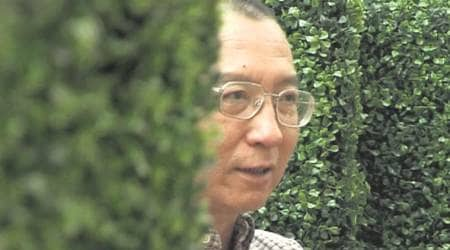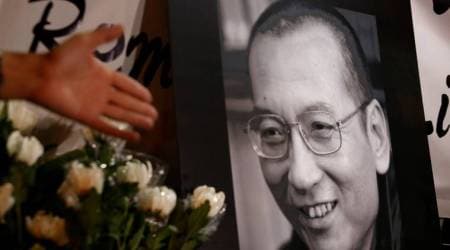 The doctors said Liu was receiving given good medical care, and could be moved outside the country for treatment.
The doctors said Liu was receiving given good medical care, and could be moved outside the country for treatment.
NOBEL PEACE prize laureate and Chinese rights activist Liu Xiaobo, 61, died on Thursday night, after suffering multiple organ failure. He is survived by his wife. Liu was diagnosed with liver cancer on May 31, and, since Monday, was in intensive care at the First Hospital of China Medical University, Shenyang, Liaoning province in northeast China.
Liu was awarded the Nobel Peace Prize in 2010, almost a year after he was handed an 11-year jail sentence for “inciting subversion of state power”, after he helped draft ‘Charter 08’ — a petition that called for a slew of political reforms in China.
Over the last week, human rights groups and western governments urged China to let Liu and his wife travel out of the country for treatment. The government allowed two cancer specialists — from the US and Germany — to visit him last week. The doctors said Liu was receiving given good medical care, and could be moved outside the country for treatment.
The Shenyang Municipal Bureau of Justice announced Liu’s death on Thursday night. In a brief statement on its website, authorities said Liu had died of multiple organ failure and that he was moved into intensive care on July 10. “The hospital also invited well-known domestic cancer experts and experts from the United States and Germany authority for treatment and to participate in consultation,” said the statement.
State-run newspaper China Daily quoted the Jinzhou Prison in Liaoning, where Liu was serving his sentence, as saying that he had Hepatitis B before his imprisonment in 2009 and had received annual health checks. “China considers the award reflects poorly on the Nobel Committee, as Liu was convicted of criminal acts against the state before the prize was announced,” the newspaper reported.
Liu was sentenced on December 25, 2009, after a Beijing court convicted him of “trying to overthrow the government”. His wife, Liu Xia, was placed under house arrest.
Born in Jilin Province, in northeast China, on December 28, 1955, Liu followed in his father’s footsteps and became a university professor. He turned a rights campaigner after the Tiananmen protests of 1989, when he was arrested and lost his teaching job.
Hours after his death, Reuters quoted Berit Reiss-Andersen, who heads the Norwegian Nobel Committee which awards the peace prize, as saying that the Chinese government bore a heavy responsibility for his death. “We find it deeply disturbing that Liu Xiaobo was not transferred to a facility where he could receive adequate medical treatment before he became terminally ill,” said Reiss-Andersen.
Liu was represented at the 2010 Nobel ceremony by an empty chair, and his acceptance speech was read out by Swedish actress Liv Ullmann. “I have no enemies and no hatred. None of the police who monitored, arrested and interrogated me, none of the prosecutors who indicted me, and none of the judges who judged me are my enemies… There is nothing criminal in anything I have done. (But) if charges are brought against me because of this, I have no complaints,” he had said.
“…My love is solid and sharp, capable of piercing through any obstacle. Even if I were crushed into powder, I would still use my ashes to embrace you. My dear, with your love I can calmly face my impending trial, having no regrets about the choices I’ve made and optimistically awaiting tomorrow,” he said to his wife, in his acceptance speech.

